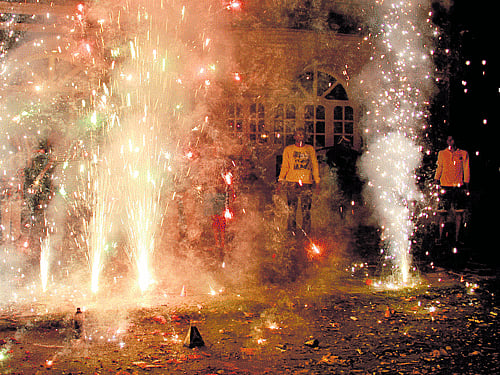
With ‘Deepavali’ almost here, Bengalureans are gearing up for the celebration and getting ready to burst crackers and light ‘diyas’. While many are staying away from crackers, there are some who will be celebrating the festival with full enthusiasm. However, there are some basic precautions that need to be followed for a safe ‘Deepavali’.
Most youngsters, who are enthusiastic about celebrating the day in all its grandeur, are also cautious. Sandeep GR, who will be with his friends and family, says that “being safe should be one’s priority”. “One has to have a bucket of water and some ointment around. Always wear cotton clothes in case the sparks fall on you,” he says.
He adds that one should avoid bursting crackers in closed spaces and near electric posts, transformers and live wires. “A first-aid kit should be kept in close proximity, just in case of emergencies.”
Radhika Parmar, a homemaker, says that crackers should always be burst at an arm’s distance and preferably on an elevated space. “Every time an ‘anar’ or ‘chakra’ is lit, one has to stoop to the ground. This can be very risky in case the cracker explodes. It’s always best to burst crackers in an open space.” She adds that lengthy sparklers should be used to light crackers like rockets. “Also ensure that you wear a protective footwear,” she advises.
Dr Srinivas HV, medical director of Aditya Netralaya, sees around four to five burn injury cases every year and around two to three cases of corneal aberration. He informs that when these particles enter the eye, they might rub against the cornea and lead to corneal aberration. “But only around five per cent of patients come with serious itching issues, which could have been caused by a foreign particle in the eye,” he says.
“Then, the dead part of the cornea has to be removed and the area has to be bandaged,” he explains. He adds that the common belief of splashing water or using over-the-counter eye drops is not a good idea.
“When one has a bloodshot eye, splashing water on it is not good as it can lead to further infections,” he adds. Even as a passerby or a motorist, one needs to be more alert, he says. “Those bursting firecrackers need to watch out for pedestrians or motorists.” According to him, prevention is always better than cure and bursting crackers at an arm’s distance is the right thing to do. “One can wear glasses with a side
protection.”
Thanks to the pollutants in the air, many breathing-related cases like asthma, cough, cold, sneezing and runny nose are also seen, says Dr Rajeeva Moger, senior consultant physician, Apollo Hospitals. He says that “those who are allergic to the chemicals also develop rashes and itching”. “Most of the allergy cases are not serious but those who have breathing difficulties like asthma and bronchitis suffer a lot. I have seen a 20 per cent rise in such cases during ‘Deepavali’ season,” he says.
In such a case one should stay indoors, he feels. “Since these difficulties occur due to the pollutants that get mixed in the air, one cannot totally avoid them. But keeping the windows closed when indoors and using masks while outside helps to an extent,”
he says.
For allergies, he says that antihistamines help while for people with breathing
difficulties, inhaler or even nebulisation is prescribed, depending on the the case. “Rashes can be avoided by keeping oneself covered fully. Also, calamine lotion can help in case of an itch.”
Sound pollution also occurs during this season. Dr Sheelu Srinivas, Consultant ENT Surgeon and Director, Dr Sheelu’s ENT Centre and Deafness Habilitation Unit, says, “There is not much that one can do about this apart from staying away from crackers entirely or bursting the less noisy ones.”
She adds, “If a cracker bursts very close to the ear, the person may experience a ringing sound in the ear or a tear in the eardrum. Any noise above 85 decibels can cause damage to the inner ear.” She advises people to burst crackers in larger spaces. “They can also use ear muffs as this dampens the sound out.”
